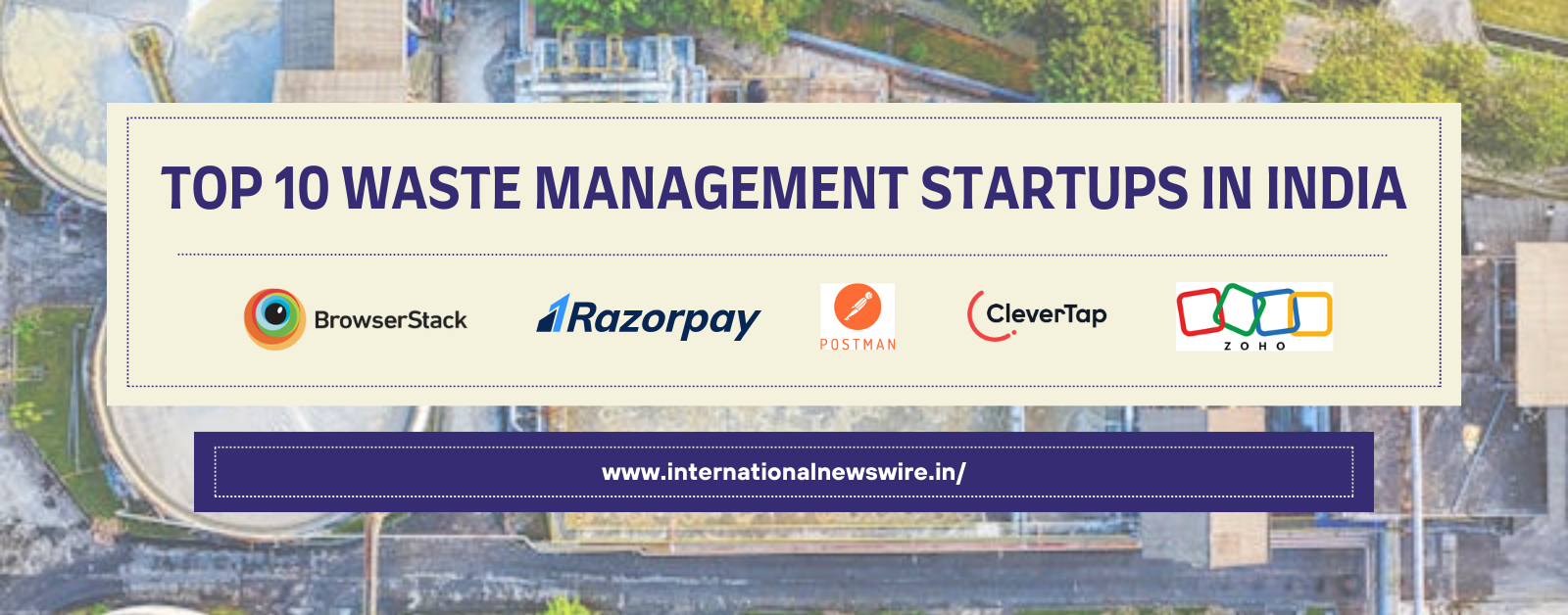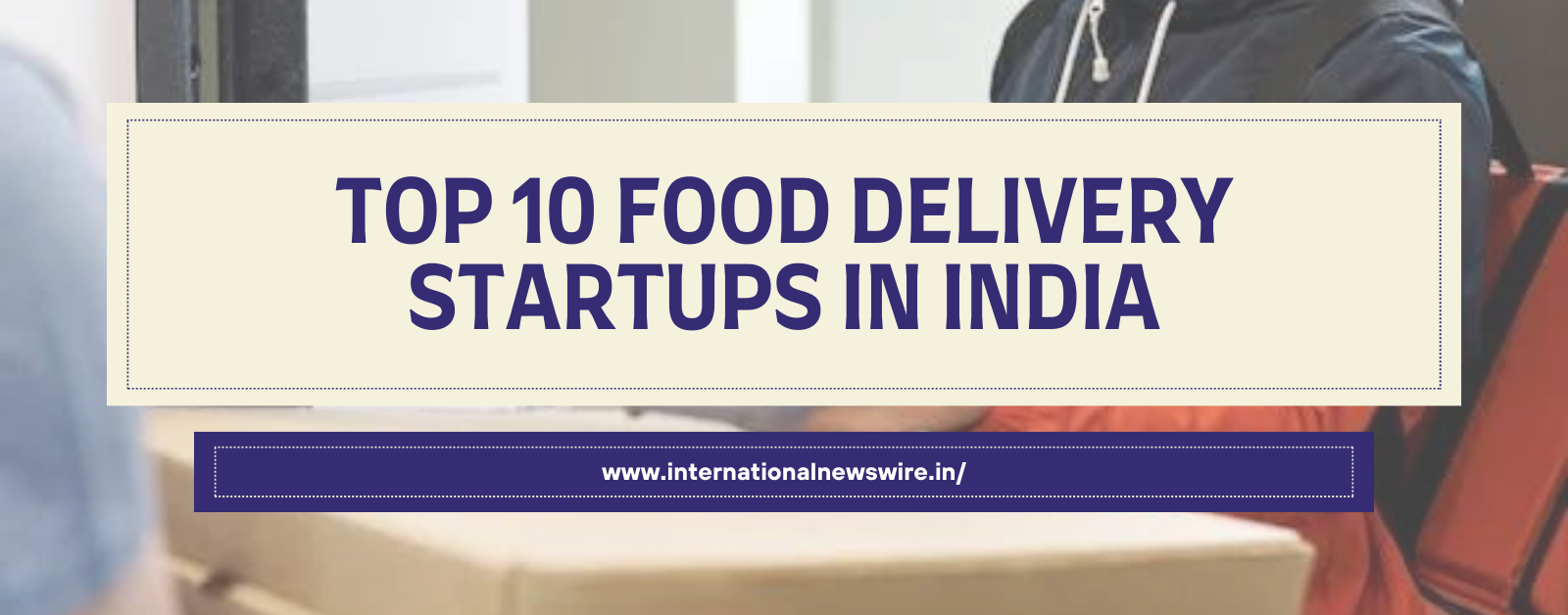India, with its rapidly growing population and urbanization, faces significant challenges in Waste Management. In recent years, a wave of innovative startups has emerged to tackle these challenges head-on. These startups are not only transforming the waste management landscape but also contributing to environmental sustainability and community welfare through their innovative solutions.
From recycling technologies to organic waste management and digital platforms connecting stakeholders, these startups are at the forefront of driving change. They are not only addressing the pressing issue of waste disposal but also promoting recycling, reducing landfill waste, and creating valuable products from discarded materials.
Here’s a closer look at some of the top waste management startups in India, each pioneering solutions that combine technology, sustainability, and social impact to pave the way for a cleaner and greener future.
Table of Contents
1. Lets Recycle
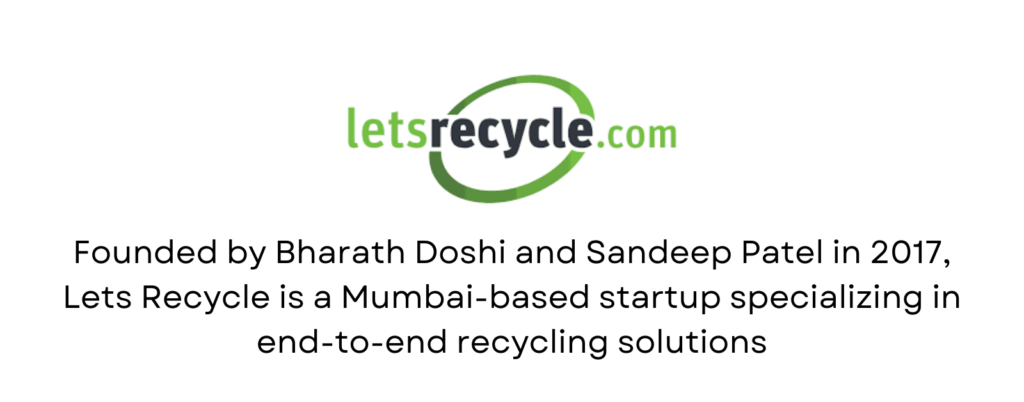
Founded by Bharath Doshi and Sandeep Patel in 2017, Lets Recycle is a Mumbai-based startup specializing in end-to-end recycling solutions. The company focuses on recycling various types of waste including paper, plastics, and e-waste. Lets Recycle leverages technology to optimize waste collection, sorting, and processing, thereby promoting environmental sustainability. With a strong market presence across India, Lets Recycle continues to expand its operations and influence in the waste management sector.
| Details | Information |
|---|---|
| Founder | Bharath Doshi, Sandeep Patel |
| Founded | 2017 |
| HQ | Mumbai, India |
| Key Product | Recycling Solutions |
| Market Presence | Nationwide |
| Website | letsrecycle.in |
Also read : Top 10 E-commerce Startups in India
2. Sampurn(e)arth Environment Solutions
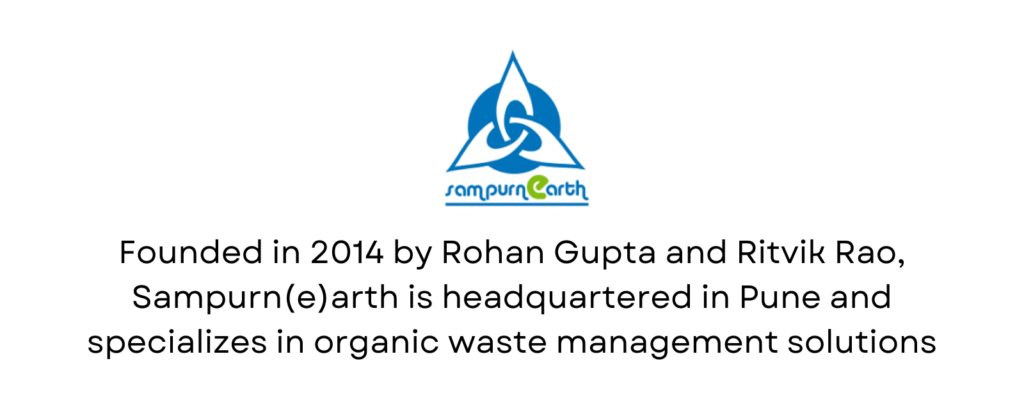
Founded in 2014 by Rohan Gupta and Ritvik Rao, Sampurn(e)arth is headquartered in Pune and specializes in organic waste management solutions. The startup offers composting services tailored for municipalities, corporate offices, and residential complexes. Sampurn(e)arth is committed to promoting sustainable waste practices and has established a significant presence in Maharashtra and Karnataka.
| Details | Information |
|---|---|
| Founder | Rohan Gupta, Ritvik Rao |
| Founded | 2014 |
| HQ | Pune, India |
| Key Product | Organic Waste Management Solutions |
| Market Presence | Maharashtra, Karnataka |
| Website | sampurnearth.com |
Also read : Top 10 AI Startups in India
3. Waste Ventures India
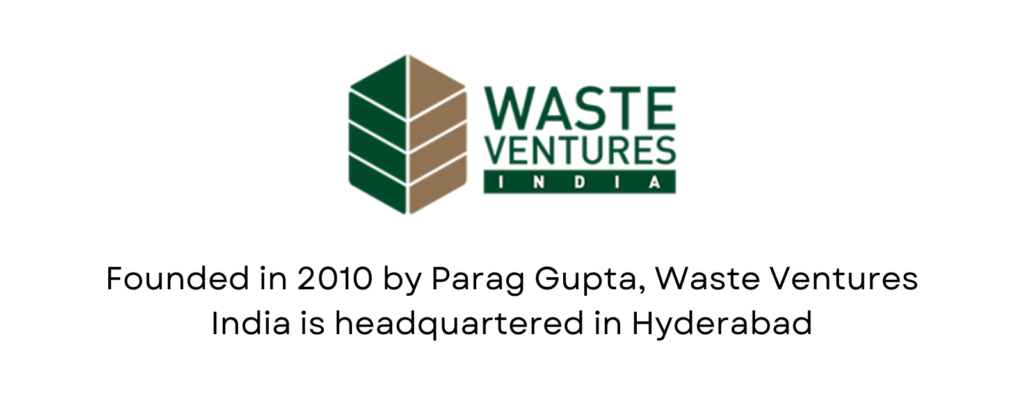
Founded in 2010 by Parag Gupta, Waste Ventures India is headquartered in Hyderabad. The startup focuses on integrating the informal waste management sector into formal supply chains, thereby improving livelihoods and environmental sustainability. Waste Ventures India operates across various cities in India, providing waste collection and recycling services.
| Details | Information |
|---|---|
| Founder | Parag Gupta |
| Founded | 2010 |
| HQ | Hyderabad, India |
| Key Product | Waste Collection and Recycling |
| Market Presence | Pan-India |
| Website | wasteventuresindia.com |
Also read : Top 10 Blockchain Startups in India
4. Blue Planet Environmental Solutions

Blue Planet Environmental Solutions, established in 2011 and headquartered in Singapore with operations in India, was founded by Madhujeet Chimni. The startup specializes in sustainable waste management solutions such as waste-to-energy and landfill management. Blue Planet Environmental Solutions serves clients across India and Southeast Asia, contributing significantly to environmental conservation.
| Details | Information |
|---|---|
| Founder | Madhujeet Chimni |
| Founded | 2011 |
| HQ | Singapore, with operations in India |
| Key Product | Waste-to-Energy, Landfill Management |
| Market Presence | India, Southeast Asia |
| Website | blueplanet-ltd.com |
Also read : Top 10 IoT Startups in India
5. Saahas Zero Waste
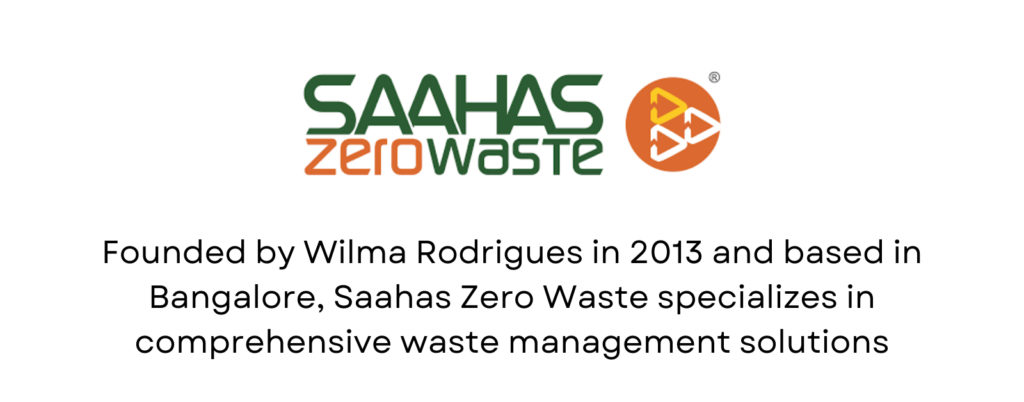
Founded by Wilma Rodrigues in 2013 and based in Bangalore, Saahas Zero Waste specializes in comprehensive waste management solutions. The startup promotes ‘zero waste’ initiatives through innovative recycling and composting technologies aimed at businesses, residential communities, and educational institutions. Saahas Zero Waste has established a strong presence in Karnataka and Maharashtra.
| Details | Information |
|---|---|
| Founder | Wilma Rodrigues |
| Founded | 2013 |
| HQ | Bengaluru, India |
| Key Product | Zero Waste Management Solutions |
| Market Presence | Karnataka, Maharashtra |
| Website | saahaszerowaste.com |
Also read : Top 10 Robotics Startups in India
6. Karma Recycling
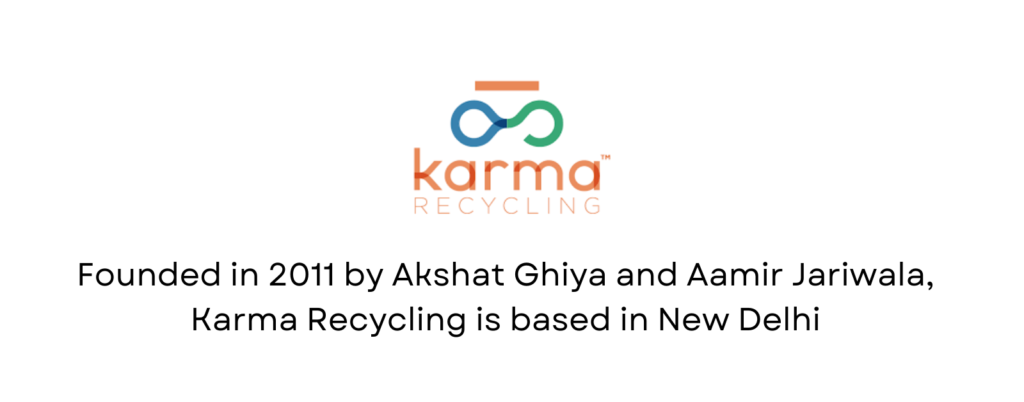
Founded in 2011 by Akshat Ghiya and Aamir Jariwala, Karma Recycling is based in New Delhi. The startup specializes in e-waste recycling and refurbishment, offering sustainable solutions to individuals and businesses nationwide. Karma Recycling plays a pivotal role in managing electronic waste responsibly and promoting circular economy practices.
| Details | Information |
|---|---|
| Founder | Akshat Ghiya, Aamir Jariwala |
| Founded | 2011 |
| HQ | New Delhi, India |
| Key Product | E-waste Recycling |
| Market Presence | Nationwide |
| Website | karmarecycling.in |
Also read : Top 10 SaaS Startups for Software in India
7. Kabadiwalla Connect
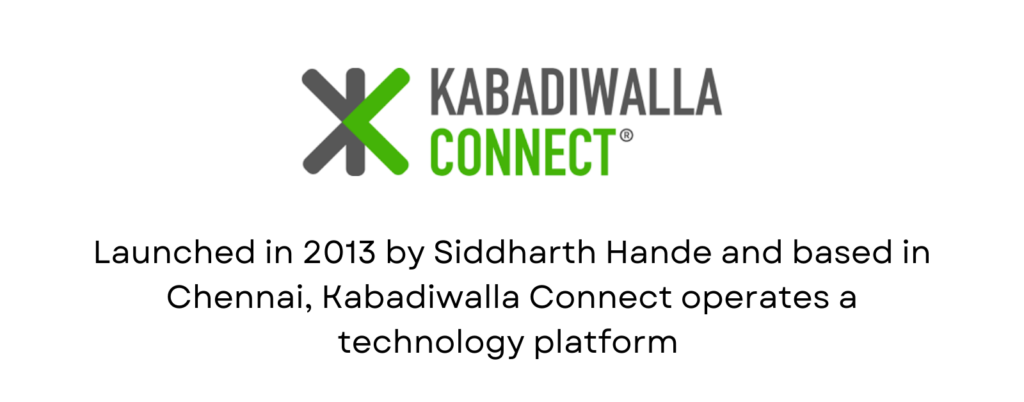
Launched in 2013 by Siddharth Hande and based in Chennai, Kabadiwalla Connect operates a technology platform connecting waste generators with informal sector recyclers. The startup facilitates efficient waste management solutions and promotes recycling practices across Tamil Nadu and Karnataka.
| Details | Information |
|---|---|
| Founder | Siddharth Hande |
| Founded | 2013 |
| HQ | Chennai, India |
| Key Product | Waste Management Technology Platform |
| Market Presence | Tamil Nadu, Karnataka |
| Website | kabadiwallaconnect.com |
Also read : Top 10 Virtual Reality Startups in India
8. Greenobin
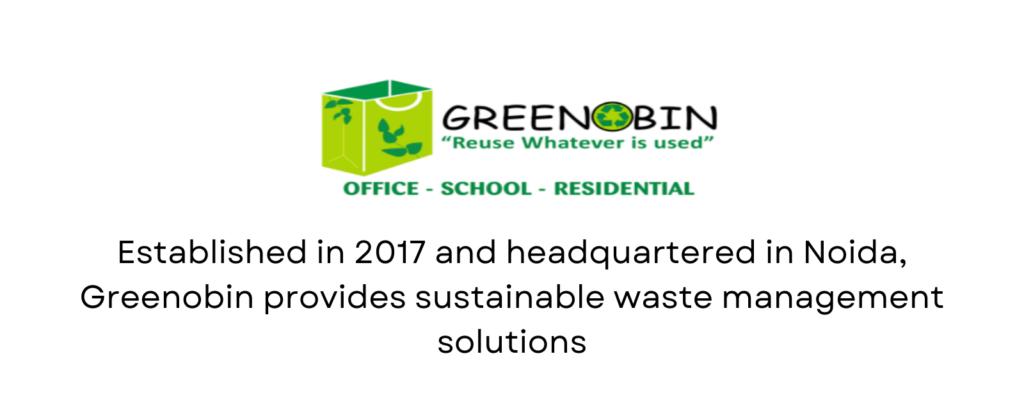
Established in 2017 and headquartered in Noida, Greenobin provides sustainable waste management solutions to corporate clients and residential societies. The startup emphasizes recycling and waste segregation practices to minimize environmental impact, primarily serving the Delhi-NCR region.
| Details | Information |
|---|---|
| Founder | Not specified |
| Founded | 2017 |
| HQ | Noida, India |
| Key Product | Corporate Waste Management Solutions |
| Market Presence | Delhi-NCR |
| Website | greenobin.com |
Also read : Top 10 Augmented Reality Start-ups in India
9. Recykal
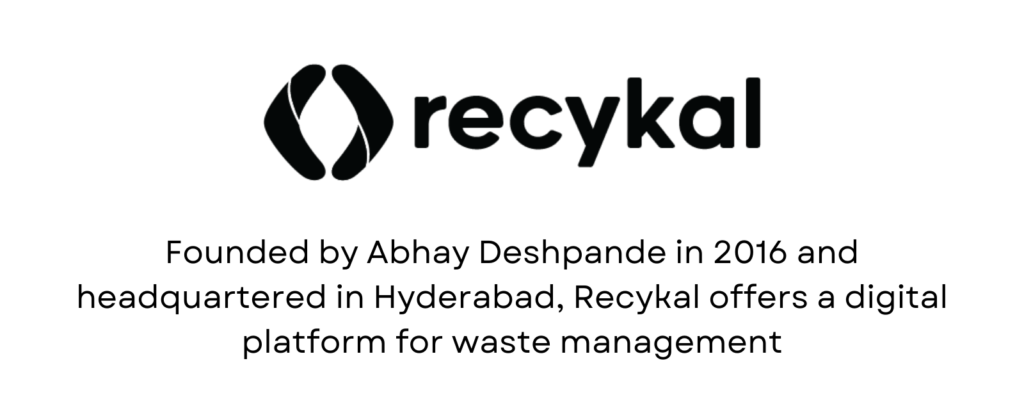
Founded by Abhay Deshpande in 2016 and headquartered in Hyderabad, Recykal offers a digital platform for waste management and recycling. The startup connects stakeholders in the waste management ecosystem to enhance operational efficiency and promote recycling initiatives across India.
| Details | Information |
|---|---|
| Founder | Abhay Deshpande |
| Founded | 2016 |
| HQ | Hyderabad, India |
| Key Product | Digital Waste Management Platform |
| Market Presence | Pan-India |
| Website | recykal.com |
Also read : Top 10 Health and Wellness Startups in India
10. Anthill Creations
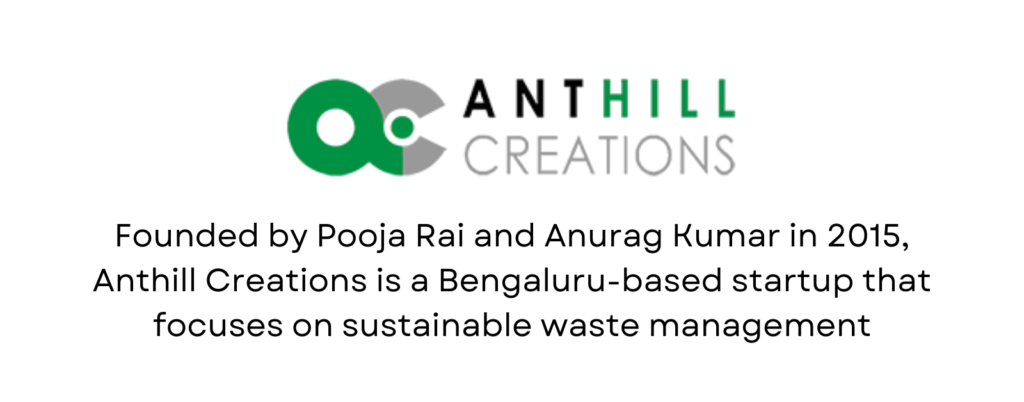
Founded by Pooja Rai and Anurag Kumar in 2015, Anthill Creations is a Bengaluru-based startup that focuses on sustainable waste management through innovative solutions. The company repurposes waste materials like tires, bottles, and barrels to create playgrounds and recreational spaces for children in underprivileged communities across India. Anthill Creations aims to promote environmental awareness and social impact by transforming waste into valuable community assets.
| Details | Information |
|---|---|
| Founder | Pooja Rai, Anurag Kumar |
| Founded | 2015 |
| HQ | Bengaluru, India |
| Key Product | Recreational Spaces from Waste Materials |
| Market Presence | Nationwide |
| Website | anthillcreations.org |
Also read : Top 10 Mental Health Start-ups in India
FAQs on waste management startups in India
Q1: What are waste management startups?
A1: Waste management startups are businesses that focus on developing innovative solutions to handle, process, recycle, or dispose of waste materials in an environmentally sustainable manner. These startups often leverage technology and sustainable practices to reduce the environmental impact of waste while promoting recycling and reuse.
Q2: Why are waste management startups important in India?
A2: Waste management startups are crucial in India due to the country’s rapid urbanization and population growth, which have led to increased waste generation. Traditional waste management systems often struggle to keep pace, leading to environmental pollution and health hazards. Startups bring fresh ideas and technologies to improve waste collection, recycling efficiency, and overall sustainability.
Q3: What types of waste do these startups manage?
A3: Waste management startups in India handle various types of waste including:
- Organic Waste: Food waste, garden waste, etc.
- Plastic Waste: PET bottles, plastic packaging, etc.
- Electronic Waste (E-waste): Discarded electronics like computers, smartphones, etc.
- Paper and Cardboard: Used paper, packaging materials, etc.
- Construction and Demolition Waste: Debris from construction sites, etc.
Q4: How do waste management startups contribute to sustainability?
A4: Waste management startups contribute to sustainability in several ways:
- Recycling: They promote recycling of materials that would otherwise end up in landfills.
- Resource Recovery: They extract valuable resources from waste materials.
- Energy Generation: Some startups convert waste into energy through processes like waste-to-energy.
- Environmental Protection: By reducing landfill waste and preventing pollution, they help protect ecosystems and natural resources.
Q5: What are some challenges faced by waste management startups in India?
A5: Challenges faced by waste management startups include:
- Regulatory Hurdles: Navigating complex regulations and compliance requirements.
- Infrastructure Limitations: Insufficient waste processing and recycling infrastructure.
- Behavioral Change: Encouraging widespread adoption of recycling and waste segregation practices.
- Financial Sustainability: Achieving profitability while investing in sustainable technologies.
- Public Awareness: Educating communities about the importance of proper waste management practices.
Q6: How can individuals and businesses support waste management startups?
A6: Individuals and businesses can support waste management startups by:
- Segregating Waste: Separating recyclable materials from general waste.
- Adopting Sustainable Practices: Using reusable products and reducing single-use plastics.
- Engaging with Startups: Collaborating with startups for waste collection or recycling services.
- Advocating for Change: Supporting policies that promote sustainable waste management practices.
- Investing or Partnering: Providing financial support or partnering with startups to scale their operations.
Q7: How do waste management startups use technology to improve efficiency?
A7: Waste management startups leverage technology in various ways to enhance efficiency:
- Digital Platforms: Many startups use digital platforms for waste collection scheduling, route optimization, and tracking.
- Internet of Things (IoT): IoT devices can monitor waste levels in bins, optimize collection routes, and improve operational efficiency.
- Data Analytics: Analytics help startups analyze waste composition, optimize recycling processes, and make data-driven decisions.
- Blockchain: Blockchain technology is used for transparent tracking of waste movements and transactions, enhancing accountability and trust in recycling processes.
Q8: What role do waste management startups play in sustainable development?
A8: Waste management startups contribute to sustainable development by:
- Reducing Environmental Impact: They minimize landfill waste and promote recycling and reuse of materials.
- Conserving Resources: By extracting valuable resources from waste, they contribute to resource conservation.
- Creating Green Jobs: Startups create employment opportunities in the green economy, supporting sustainable livelihoods.
- Improving Public Health: Proper waste management reduces pollution and health risks associated with waste disposal.
- Supporting Circular Economy: They facilitate the transition towards a circular economy by closing the loop on waste materials through recycling and upcycling.
Q9: How can waste management startups address the issue of plastic pollution in India?
A9: Waste management startups combat plastic pollution through:
- Plastic Recycling: Establishing facilities to recycle plastic waste into new products.
- Awareness and Education: Educating communities about the importance of reducing single-use plastics and proper disposal practices.
- Innovative Solutions: Developing biodegradable alternatives to traditional plastics and promoting their adoption.
- Policy Advocacy: Advocating for policies that incentivize plastic recycling and reduce plastic production.
- Partnerships: Collaborating with industries and governments to implement effective plastic waste management strategies.
Q10: How can startups ensure scalability and sustainability in waste management?
A10: Startups can achieve scalability and sustainability by:
- Technology Adoption: Continuously investing in technology to improve operational efficiency and expand service capabilities.
- Partnerships and Collaborations: Forming alliances with municipalities, businesses, and NGOs to scale operations and access new markets.
- Customer Engagement: Engaging with customers to understand their needs and tailor solutions accordingly.
- Diversifying Revenue Streams: Offering multiple waste management services and exploring new markets and sectors.
- Adaptability: Being adaptable to regulatory changes, market dynamics, and technological advancements to stay competitive and sustainable.
Conclusion
In conclusion, waste management startups in India are pivotal players in addressing the country’s growing waste challenges while promoting sustainability and environmental stewardship. These innovative enterprises leverage technology, sustainable practices, and community engagement to transform the way waste is handled, recycled, and repurposed.
Through initiatives such as recycling, organic waste management, and technological innovations like digital platforms and IoT integration, these startups not only reduce the burden on landfills but also conserve resources and mitigate environmental impact. They play a crucial role in fostering a circular economy by closing the loop on waste materials and promoting the reuse of resources.
However, these startups face significant challenges such as regulatory hurdles, infrastructure limitations, and the need for widespread behavioral change among communities. Overcoming these challenges requires continued innovation, collaboration with stakeholders, and supportive policies that incentivize sustainable practices.
By supporting waste management startups through advocacy, partnerships, and responsible waste disposal practices, individuals, businesses, and policymakers can contribute to building a cleaner, greener future for India. Together, we can empower these startups to scale their impact, improve environmental outcomes, and create sustainable communities for generations to come.
Also Read
- Top 10 E-commerce Startups in India
- Top 10 AI Startups in India
- Top 10 Blockchain Startups in India
- Top 10 IoT Startups in India
- Top 10 Robotics Startups in India
- Top 10 SaaS Startups for Software in India
- Top 10 Virtual Reality Startups in India
- Top 10 Augmented Reality Start-ups in India
- Top 10 Health and Wellness Startups in India
- Top 10 Mental Health Start-ups in India
Last Updated on Monday, June 17, 2024 2:17 pm by International Newswire Team
